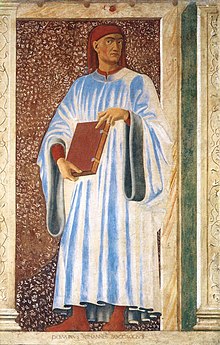Boccaccio (Hesse)
Boccaccio is a biographical essay on Giovanni Boccaccio by Hermann Hesse , published in April 1904 by Schuster & Loeffler in Berlin.
content


The storyteller's father, born in Certaldo , lives as a small businessman in Florence . When he was in Paris for a long time on behalf of a Florentine banker, he fell in love with a beautiful widow. Giovanni Boccaccio emerged from the relationship in 1313. When Giovanni was born, his father had long since left the dust. The mother dies much too early and the boy grows up with his father in Florence. Of course Giovanni should take up his father's profession, but he does not like arithmetic and doing. He much prefers to appropriate the works of Dante and Virgil . The father reacts. He sends Giovanni to the university in Naples. The boy is to become a lawyer . Instead of canon law , Giovanni "studies" Donna Maria, the illegitimate daughter of King Robert, around 1334 . The mistress is married to the Count of Aquino. However, this does not bother the couple. In 1341, when Gautier of Brienne , Duke of Athens , ruled over Florence, Giovanni was recalled from Naples by his father. In 1344, while the plague was raging in Italy, Giovanni returned to Florence. When Maria and the father die, Giovanni lives on his inheritance in Florence. The decameron was built in the early 1950s . Giovanni falls in love one more time, with a noble widow. But she finally chases him away. From then on Giovanni has had enough of women and pretends to be a misogynist. For Florence he went to Avignon as an ambassador to the Pope and continued to study his Dante in old age. Incidentally, he dismissed the immortal decameron as youthful folly in his later years. After Giovanni died on December 21, 1375, the city of Florence gave him an honorable burial.
shape
Hesse uplifts Giovanni Boccaccio by making himself small. Boccaccio could write ten times better than him. Little has been handed down from the poet's vita . Hesse's essay is narrow. Two thirds of the text also take up the discussion of the decameron . Hesse particularly likes two stories, first of all the ninth novella of the fifth day. In it Fiammetta tells of lovers who come to a happy ending after bad incidents. This is the story of Federigo deghli Alberighi and his falcon. Federigo puts the animal in front of her lover when she visits him. And there is the sixth novella of the fourth day. Filostrato tells of unhappy love, Gabriotto and Andreuola tell each other their dreams. Gabriotto dies surprisingly in the arms of her lover. Hesse raves about "such beauties".
Book editions
- Boccaccio. Schuster & Loeffler, Berlin 1904 (The Poetry, Volume 7), ( eBook gutenberg.org ).
- Boccaccio, the poet of the Decameron. Insel, Frankfurt am Main 1995, ISBN 3-458-19131-3 ( Insel-Bücherei , Volume 1131).
literature
- Volker Michels (ed.): Hermann Hesse: Complete works in 20 volumes. (Volume 1: Youth Writings). Suhrkamp, Frankfurt am Main 2001, ISBN 3-518-41101-2 .
- Giovanni Boccaccio: The Decameron. (Part 1). Berlin 1980, ISBN 3-351-00572-5 .
Individual evidence
- ↑ Michels: Hermann Hesse. All works in 20 volumes. 2001, p. 678; 690.
- ↑ a b c d Michels: Hermann Hesse. All works in 20 volumes. 2001, pp. 600-603.
- ↑ Boccaccio: The Decameron. 1995, pp. 435-441.
- ↑ Boccaccio: The Decameron. 1995, pp. 339-346.
- ↑ Michels: Hermann Hesse. All works in 20 volumes. 2001, p. 618.
